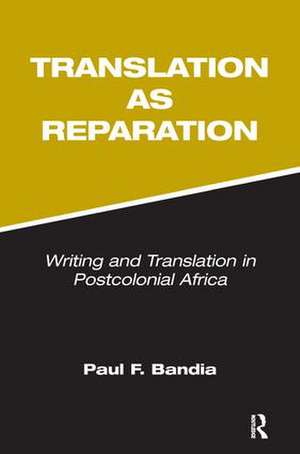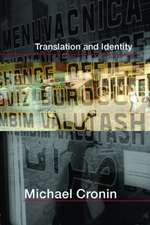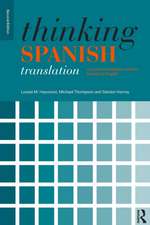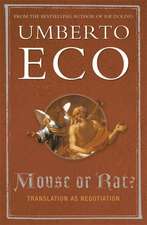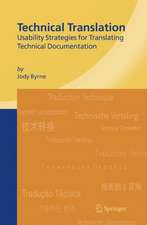Translation as Reparation
Autor Paul Bandiaen Limba Engleză Hardback – 27 iul 2016
Grounded in a multidisciplinary approach, the book will be of interest to students and scholars in a variety of fields, including translation studies, African literature and culture, sociolinguistics and multilingualism, postcolonial and intercultural studies.
| Toate formatele și edițiile | Preț | Express |
|---|---|---|
| Paperback (1) | 246.74 lei 6-8 săpt. | |
| Taylor & Francis – 31 ian 2008 | 246.74 lei 6-8 săpt. | |
| Hardback (1) | 764.20 lei 6-8 săpt. | |
| Taylor & Francis – 27 iul 2016 | 764.20 lei 6-8 săpt. |
Preț: 764.20 lei
Preț vechi: 1154.59 lei
-34% Nou
Puncte Express: 1146
Preț estimativ în valută:
146.23€ • 159.34$ • 123.22£
146.23€ • 159.34$ • 123.22£
Carte tipărită la comandă
Livrare economică 23 aprilie-07 mai
Preluare comenzi: 021 569.72.76
Specificații
ISBN-13: 9781138177451
ISBN-10: 1138177458
Pagini: 280
Dimensiuni: 156 x 234 mm
Greutate: 0.45 kg
Ediția:1
Editura: Taylor & Francis
Colecția Routledge
Locul publicării:Oxford, United Kingdom
ISBN-10: 1138177458
Pagini: 280
Dimensiuni: 156 x 234 mm
Greutate: 0.45 kg
Ediția:1
Editura: Taylor & Francis
Colecția Routledge
Locul publicării:Oxford, United Kingdom
Public țintă
PostgraduateCuprins
Introduction
Chapter 1: African Europhone literature and the politics of language
1. Introduction
2. The polemics of language
3. Colonial language policies
4. Criticism and responses
5. Critical view of orality and its influences
6. The complex union of writing and orality
Chapter 2: Intercultural writing as translation
1. Introduction
2. The pragmatics of African oral discourse in European-language writing
2.1. Crosscultural pragmatics and intercultural writing
2.2. Theoretical relevance for transcultural analysis
3. Writing culture and identity
4. Sociopragmatics and culture-specific discourse
5. What's in a name? Writing traditional onomastic practices
5.1. Pragmatic functions of naming
Chapter 3: Cultural representation and postcolonial aesthetics
1. Introduction
2. Interculturality and discoursal indirectness
3. The art of oratory
4. Proverbs, aphorisms and intercultural narratives
4.1 Proverb patterns and style
4.2 Proverb content and meaning
5. Intercultural narratives and 'African time' concepts
6. The aesthetics of vulgarity
Chapter 4: Linguistic experimentation and intercultural writing
1. Introduction
2. Lexical innovation and formation
3. Semantic shifts
4. Interpolations of the vernacular
5. Hybrid formations and some lexical innovation strategies
6. Recreating ornamental discourse
Chapter 5: Literary heteroglossia, sociolects, translation
1. Pidgins and creoles in creative writing
2. Linguistic hybridity in Francophone literature
3. Polylingualism and intercultural writing
4. Code-switching and literary stylistics
5. Code-switching, translation and resistance
Chapter 6: Intercultural writing and inter-European language translation
1. Interculturality, heteroglossia and inter-European language translation
2. Towards a postcolonial translation theory for African literature
3. From orature to writing: accented translation between colonial languages
4. Tripartite or three-tier approach
4.1. Initial translation or the orality/writing interface
4.2. Postcolonial translation as conversion
5. Between Francophone and Anglophone literatures: translation as conversion
Chapter 7: African Europhone literature and the ethics of translations
1. Creative writing and translating in non-indigenous or second languages
1.1. The impact of orality
1.2. Language contact and cultural encounter
2. Postcoloniality and translation
3. Writing, translation and an ethics of difference
3.1. Translation equivalence or sameness in difference
Chapter 1: African Europhone literature and the politics of language
1. Introduction
2. The polemics of language
3. Colonial language policies
4. Criticism and responses
5. Critical view of orality and its influences
6. The complex union of writing and orality
Chapter 2: Intercultural writing as translation
1. Introduction
2. The pragmatics of African oral discourse in European-language writing
2.1. Crosscultural pragmatics and intercultural writing
2.2. Theoretical relevance for transcultural analysis
3. Writing culture and identity
4. Sociopragmatics and culture-specific discourse
5. What's in a name? Writing traditional onomastic practices
5.1. Pragmatic functions of naming
Chapter 3: Cultural representation and postcolonial aesthetics
1. Introduction
2. Interculturality and discoursal indirectness
3. The art of oratory
4. Proverbs, aphorisms and intercultural narratives
4.1 Proverb patterns and style
4.2 Proverb content and meaning
5. Intercultural narratives and 'African time' concepts
6. The aesthetics of vulgarity
Chapter 4: Linguistic experimentation and intercultural writing
1. Introduction
2. Lexical innovation and formation
3. Semantic shifts
4. Interpolations of the vernacular
5. Hybrid formations and some lexical innovation strategies
6. Recreating ornamental discourse
Chapter 5: Literary heteroglossia, sociolects, translation
1. Pidgins and creoles in creative writing
2. Linguistic hybridity in Francophone literature
3. Polylingualism and intercultural writing
4. Code-switching and literary stylistics
5. Code-switching, translation and resistance
Chapter 6: Intercultural writing and inter-European language translation
1. Interculturality, heteroglossia and inter-European language translation
2. Towards a postcolonial translation theory for African literature
3. From orature to writing: accented translation between colonial languages
4. Tripartite or three-tier approach
4.1. Initial translation or the orality/writing interface
4.2. Postcolonial translation as conversion
5. Between Francophone and Anglophone literatures: translation as conversion
Chapter 7: African Europhone literature and the ethics of translations
1. Creative writing and translating in non-indigenous or second languages
1.1. The impact of orality
1.2. Language contact and cultural encounter
2. Postcoloniality and translation
3. Writing, translation and an ethics of difference
3.1. Translation equivalence or sameness in difference
Descriere
Translation as Reparation showcases postcolonial Africa by offering African European-language literature as a case study for postcolonial translation theory, and proposes a new perspective for postcolonial literary criticism informed by theories of translation
